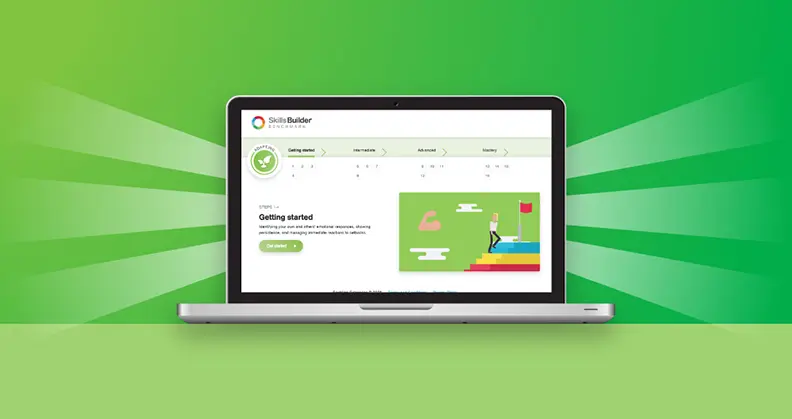Creativity can sometimes be an overlooked skill, but when you, or your team is faced with unexpected challenges or a lack of clear solutions - honing this ability can be the secret ingredient for success.
Learning how to be creative is essential for your professional development, as it supplements your problem solving skills and leads to new ideas or ways of thinking. In order to be at your most creative, it’s important to seek out varied experiences and stimuli that can allow you to contribute new ideas or perspectives to the rest of the team.
During the middle of your career, many may wonder how to develop in a way that keeps your skillset relevant and adaptable to a changeable future. Building creativity is excellent for this, as it allows you to remain innovative, to create the ideas and solutions that those around you can rely on. Also, during these times of AI advancement, creativity is a uniquely human skill to have - so building it could also help to insulate your role against the effects of automation.
Read on for tips on how to find experiences and stimuli to boost your creativity as well as suggestions for how to get the most out of creative discussions with your colleagues.
Which experiences can boost your creativity?
As we experience growth in our role, sometimes we can overlook creativity as a tool for personal development. Almost any experience can add value for the creative process - the key is seeing how your own unique experiences can align with the specific problem or brief that you are trying to solve. Often in team-based environments, there is a risk of succumbing to group-think, where only a limited number of people in the team contribute to the decision-making process. This limits the team’s overall ability to innovate effectively as it means that any idea or solution will be equally limited in scope. As a result, the problem may not be solved as effectively as everyone would have initially hoped.
In order to better utilise your experience to boost creativity skills, you can:
- Reflect on past career roles and consider how you would approach the challenge back then. This is especially valuable if you worked in a different industry to the one you’re currently in - as you may know different processes or ways of thinking that can be used in your current role.
- Network with people outside of your company or even in different countries. How does your role look in those different situations and what is the team dynamic like?
- If you’re able to - why not visit other places of work? Imagine your team worked on a production line making cars - what difference would you see if you visited a company that produces bicycles or aircraft instead?
- Attend training and events, as well as keeping up-to-date on the latest news in your industry. These could be specific to other personal development goals, or general interest.
- Also be open minded and consider how experiences outside of work can apply. Do you have any useful experiences as a result of a hobby or place you’ve visited?
This leads us onto stimuli...
How can stimuli help unlock your creativity?
If experiences are the building blocks of ideas, stimuli is what triggers them. In the workplace, stimuli can take the form of a brainstorming session, a walk and talk meeting, or creative ideas could even appear at random over your lunch break coffee. The key is to allow your mind space to process the problem or challenge in the background - whilst staying in a relaxed state. It’s for this reason that many people find that they come up with their best ideas during mundane activities like taking a shower, walking the dog or getting dressed in the morning - all these moments are times when your brain can dedicate less energy to completing complex tasks, and more energy on thinking.
Things that help stimulate your creativity include:
- Going outside for a walk
- Reading magazines or news articles at the start of your day - especially if they’re relevant to the industry or sector you work in
- Listening to the radio or a podcast whilst you work
You might also be increasingly working in a team, and sometimes taking the lead. Being creative in a team can be a challenge, but you can help stimulate your team’s creativity by:
- Setting meetings to first thing in the morning or after lunch so that people’s minds are fresh and not preoccupied with other tasks at work
- Changing the setting - can you all share ideas in a different room - or different place entirely?
- Play a game or share some small talk - get everybody relaxed and talkative before getting down to the task at hand
The benefits of innovating as a team
Innovating as a team can supercharge your collective creativity by bringing a wider range of experiences and perspectives - which can then lead to more and better ideas. Innovating as a group can allow you to:
- Come up with a greater volume of ideas - which then leads to a greater number of combinations that can be made between those ideas
- Refine those ideas faster - the more people involved means the more questioning can take place meaning that your final solution is more likely to succeed.
- Test your idea from multiple perspectives - if your group is a diverse mix of people, it means that you can approach the challenge from a greater number of angles. Ask yourself whether you could include a more junior member of staff, somebody outside your team or somebody with a different cultural background to the discussion.
Avoiding risks when innovating as a team
It is also important to be mindful of the risks involved when innovating as a team, as this can limit your chance of success or the quality of ideas that you create. Make sure to:
- Avoid rushing consensus and succumbing to groupthink - If some team members are quieter during the discussion, give them a chance to speak too and ask them what they think. It can also help to split your group into even smaller teams to brainstorm separately - and then bring them back together later to share their ideas.
- Get a diverse range of people on the team - This means diversity in every sense of the word. Don’t just limit yourself to just people in your role or people who are similar to you - seek out colleagues, or even those outside your organisation, when appropriate, who can look at the problem from a different angle.
- Make sure your discussions are a safe space for everyone involved - This can be largely influenced by the team dynamic or by who the decision makers are in the group. Make it clear that you welcome the team’s ideas - even the more challenging ones. A good tip is to also allow everyone in the group the opportunity to contribute their ideas later after the main discussion has ended in order to allow second-thought and last minute ideas to come through. It may also be worth allowing them to do this confidentially if there is a need to make sharing those ideas feel safer.
Want to build this skill further?
Check out creativity in the Skills Builder Framework to see how you can progress your creative skills in work and everyday life. If you’d like more guidance on working creatively in a team, we recommend visiting Step 11. Or, if you want to see advice on how to seek out more experiences and stimuli, take a look at Step 12.
Further reading:
A technique for producing ideas - by James Webb Young - McGraw-Hill Companies Publishing






